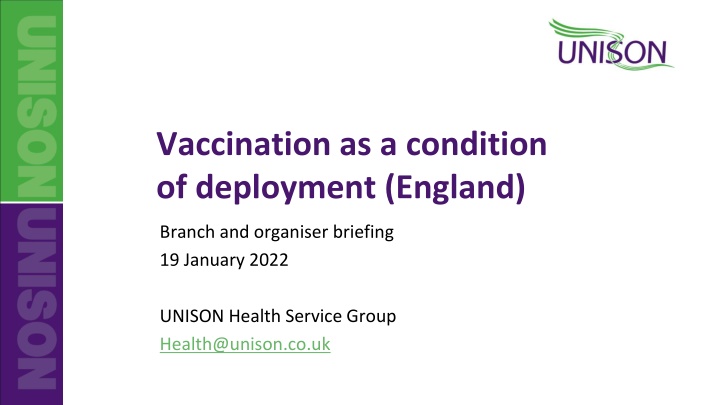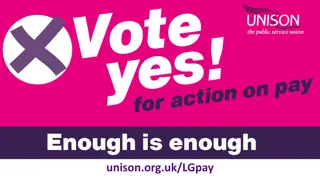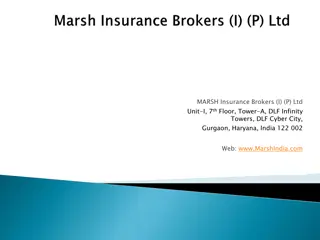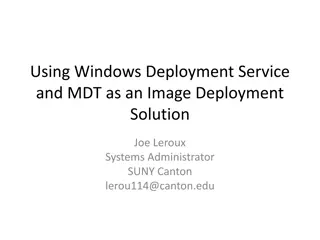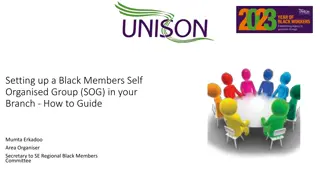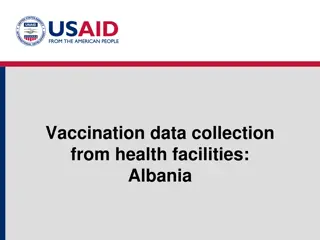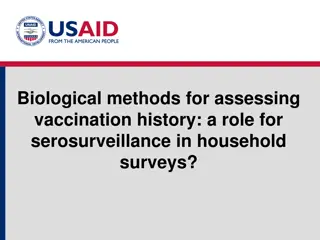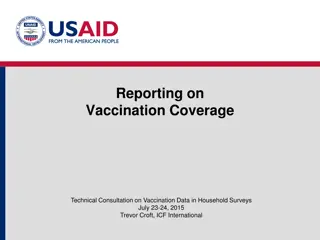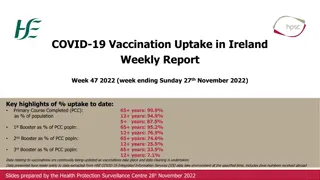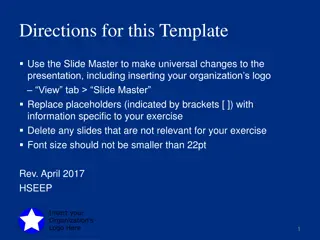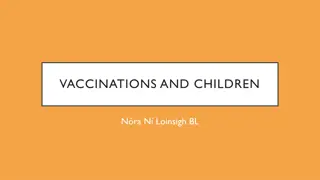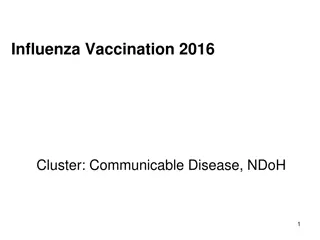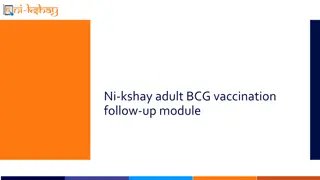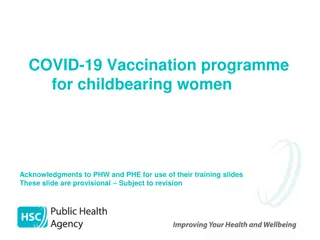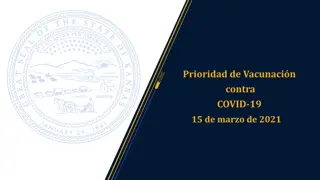UNISON Briefing on Vaccination as a Condition of Deployment in England
UNISON provided a briefing on the UK government's policy making vaccination a condition of deployment for health and social care workers in England. The briefing outlines key information, UNISON's position on vaccination, government regulations, key dates, and actions taken by UNISON to influence the policy. The government's regulations require certain workers to be fully vaccinated by April 1, 2022, with limited exemptions. UNISON supports vaccination but opposes mandatory vaccination. The briefing emphasizes the importance of persuasion and reassurance in vaccination efforts.
Download Presentation

Please find below an Image/Link to download the presentation.
The content on the website is provided AS IS for your information and personal use only. It may not be sold, licensed, or shared on other websites without obtaining consent from the author.If you encounter any issues during the download, it is possible that the publisher has removed the file from their server.
You are allowed to download the files provided on this website for personal or commercial use, subject to the condition that they are used lawfully. All files are the property of their respective owners.
The content on the website is provided AS IS for your information and personal use only. It may not be sold, licensed, or shared on other websites without obtaining consent from the author.
E N D
Presentation Transcript
Vaccination as a condition of deployment (England) Branch and organiser briefing 19 January 2022 UNISON Health Service Group Health@unison.co.uk
Outline (click on link to jump to section) 1. 2. 3. 4. 5. 6. 7. 8. 9. 10. Branch resources UNISON position on VCOD Government vaccine policy Key Dates UNISON Actions NHS Guidance UNISON Advice Regulations Next Steps National Actions
UNISONs position on VCOD UNISON supports vaccination in health and social care. The vaccine is safe, and we encourage all members who do not have a medical exemption to get their jab. But vaccination should be your decision and the UK government should promote persuasion and reassurance. UNISON opposed making the Covid (and flu) vaccine mandatory on the basis that persuasion was clearly working. UNISON remains concerned about the impact that VCOD would have on volume of work and staffing levels.
Government vaccine policy (1) Key facts: In late 2021, new regulations were agreed by parliament making it unlawful for an employer delivering Care Quality Commission (CQC) regulated activities, to deploy an unvaccinated worker in a face-to-face role from 1stApril 2022. There are some limited exemptions within the regulations. These include those under 18, those clinically exempt, those taking part in a COVID trial, those without face-to-face contact and those providing care as part of a shared lives agreement.
Government vaccine policy (2) Key facts: Vaccinated is defined as a complete course of a Medicines and Healthcare products Regulatory Agency (MHRA) approved COVID-19 vaccine . This does not currently include the booster jab. The 3rdof February 2022 is the last date for workers to get their 1stdose to be fully vaccinated in time for when the regulations take force from 1stApril 2022.
Key dates 6thJanuary 2022 regulations came into force (there is a 12- week grace period to allow staff and employers to increase vaccination uptake in time for full implementation on 1st April 2022). 3rdFebruary 2022 the last date by which the first vaccine can be taken to complete the full course of vaccination in time for 31stMarch 2022. 4thFebruary 2022 the date from which employers can start final formal processes. 1stApril 2022 full implementation of vaccine as a condition of deployment regulations.
UNISON Actions To influence the government not to introduce Vaccination as a Condition of Deployment for NHS staff, UNISON has: Undertaken a wide range of national and regional print and broadcast media (since the mandate was first mooted in 2020 and continuing to date), Addressed senior government ministers including raising directly with Secretary of State for Health and Minister for Workforce (ongoing discussion), Responded to the formal consultation outlining the risks of implementation, Undertaken numerous parliamentary briefings ahead of both the formal consultation and the regulatory process, Raised the issue and impact through formal structures including the NHS Staff Council and NHS Social Partnership Forum, Jointly call for delay/extension of grace period with NHS Employers to Minister.
NHS Guidance (1) NHS England has published two sets of guidance, which UNISON and other health TUs have contributed to through the NHS Social Partnership Forum. 1. Vaccination as a Condition of Deployment (VCOD) for Healthcare Workers. Phase 1 Planning and preparation 2. Vaccination as a Condition of Deployment (VCOD) for Healthcare Workers. Phase 2 VCOD Implementation
NHS Guidance (2) Main emphasis is to encourage uptake of the vaccine in those people who are currently unvaccinated or partially vaccinated. Includes working in partnership with trade unions, disseminating vaccine information, conducting supportive one-to-one conversations, and engaging with clinical and community experts to convert vaccine hesitancy to vaccine uptake. Those who are exempt can remain working in their current roles and employers should ensure risk assessments are updated and all measures are in place.
NHS Guidance (3) Three main outcomes from the formal processes are contained in the NHS guidance. 1.Reconfiguration of roles 2.Redeployment for the purposes of VCOD Temporary or Permanent redeployment 3.Termination of employment for the purposes of VCOD
NHS Guidance (4) From 1stApril 2022, it will be unlawful for an employer to deploy staff who continue to remain unvaccinated without an exemption (or refuse to disclose their vaccination status) in face-to-face roles. If all other options have been objectively discounted then the employer may seek to dismiss the employee on the grounds of a contravention of statutory restriction or in the alternative, some other substantial reason (SOSR).
UNISON Advice (1) UNISON has produced branch advice Vaccination as a Condition of Deployment (VCOD) in England UNISON Branch advice and some frequently asked questions (updated regularly) Vaccination as a condition of deployment (VCOD) for health and care workers (England) Frequently Asked Questions
UNISON Advice (2) UNISON should not advise any member to be vaccinated against their will. UNISON should not advise members to refuse a vaccination. This is an individual decision for the staff member alone to make. UNISON should be ensuring that employers are providing the right information for people to make an informed decision.
UNISON Advice (3) Employers expected to work in partnership on VCOD policy, including with health and safety reps on risk assessments. However, the employers own the process for dismissal. UNISON s role is to represent members through the processes, to ensure staff can make their case and seek consistent and fair outcomes. UNISON cannot give a view about whether a person s individual reasons for refusal are reasonable or not. UNISON representatives should ensure members understand that a continued refusal to become fully vaccinated may ultimately lead to a dismissal under the current regulations.
UNISON Advice (4) UNISON branches should follow normal rules for representation as set out in the Code of Good Branch Practice and Member representation a UNISON guide . This includes the use of a UNISON case form to record relevant information, including records of formal meetings and correspondence with the employer. In the event of a dismissal, normal case processes apply. UNISON cannot promise legal outcomes as these new regulations are untested in the courts.
UNISON Advice (5) UNISON branches can support members with: getting access to information to support their decision making for example, accessing occupational health or other medical advice on exemptions or to overcome hesitancy, discussions with employers about whether roles are in scope of the regulations, making their case to their employer through the formal processes including making suggestions on potential adjustments to their current role or redeployment options, understanding the impact of the vaccination policy.
Regulations The regulations have been passed by parliament. There is no further parliamentary process required to enact the VCOD regulations and our assessment is that there is extremely little scope for a political U-turn. There are no legal angles through which we can see the principles of the VCOD regs and their application can be challenged although we will continue to review. An attempt to bring a judicial review on the similar regs in care settings was not allowed.
Next Steps Employers will be taking the next steps to comply with the new legal requirements placed on them. UNISON must focus on providing accurate information to branches about the policy and the union s role in representing members subject to the redeployment or dismissal process. UNISON must be clear with members about the impact of the VCOD regulations and the risk of dismissal. UNISON branches should support members through the process including ensuring employers use redeployment options we pressed for within the official guidance issued from NHS.
National Actions Support UNISON branches and monitor case work. Continue to use our media profile to flag the impact VCOD will have on staffing and the remaining workforce, in the context of a day-to-day staffing crisis in the NHS. Continue to raise the issue through policy routes and in related work such our evidence to the NHS Pay Review Body and the current Health Select Committee enquiry on Staff Burnout*. *UNISON have warned that not enough is known about currently unvaccinated staff in terms of their protected characteristics to make a full assessment of the impact of the policy from an equalities perspective.
Branch Resources VCOD guidance Phase 1 VCOD guidance Phase 2 UNISON NHS FAQs Bargaining support guide NHS Support Available for our NHS People UNISON There for You 2019 UNISON Rulebook Code of Good Branch Practice 2014 Member representation A UNISON guide Policy Lead Alan Lofthouse UNISON Health Group health@unison.co.uk
